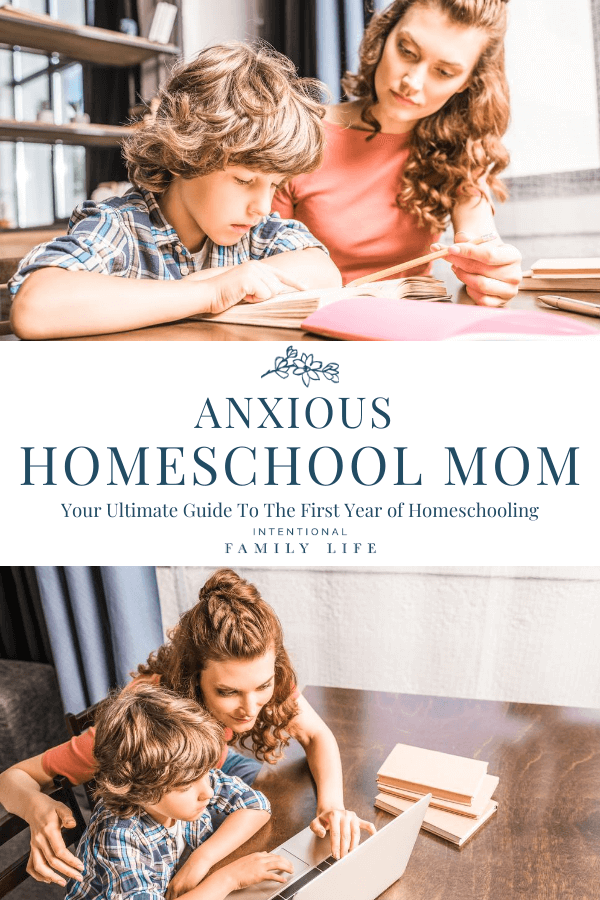Spoiler Alert: If you’ve ever wondered about how to start homeschooling, or about homeschool families in general, you aren’t alone. If you’ve decided to start homeschooling one or more of your children, or if you’re still considering whether it’s the right option for you, the available homeschool resources and information are overwhelming. There are online homeschool programs and online homeschool curriculum – what’s the difference? Homeschool planners, scheduling, organization, classroom hacks, record keeping, and supplies – oh, my! So as I started our homeschool journey this year – I was taking notes and saving everything I learned so that I could share it with you. Here are the ten most important things to consider if you are learning how to homeschool!
First Thing First
If you’re wondering if you should start homeschooling, or even how to start homeschooling, you’ve probably answered the question, “Why homeschool?” What were your answers? What is your intention?
I considered homeschool for almost two years before finally taking the leap. (And, honestly, I wish I’d done it sooner.)
Once we got started, I knew tough days lie ahead. (Today was one of those, BTW)
But, beyond the searches on Pinterest of beautiful homeschool rooms, happy smiling homeschool children, June Cleaver-esque homeschool moms, homeschooling spaces and school decor; beyond the spiffy planners; beyond my worries about socialization, set-up, and resources, there lay this vast space that I would need to fill with learning…
Since I had spent hours on Pinterest, I knew that wonderful and heartwarming moments and days lie ahead. I dreamed of a happy child eager to learn and read and the two of us loving learning together.
This was a huge responsibility. What if I was the only thing standing between my son’s future success or his life lived forever unemployed in my basement?
To keep me going on the tough days, I wanted a way to quickly remind myself why I chose homeschooling.
What was it that was so close to my heart and that I was so passionate about that would pull me through the difficult days?
I encourage you to ask yourself the same question. If you need help getting started,
CLICK HERE >>> for my free printable that will give you a list of questions to gain valuable insight into your own why.
Learn The Homeschooling Laws In Your State
Currently, homeschooling is legal in all states. But, you need to know the laws as they pertain to how to start homeschooling in your specific state – because requirements can vary quite a bit in each state.
Each state has it’s own laws and reporting requirements. You may be required to do such things as provide annual notice of your intent to homeschool, keep attendance records, keep performance records, or perform periodic testing. Responsible homeschooling provides a state by state list of legal homeschooling requirements.
Homeschool Mom – You Need To Find Your People
I’ve got one word for you here, homeschool mama. Tribe.
Find yours. I have a terrific tribe, scattered everywhere, so we typically connect online.
But rest assured, you will find your homeschooling tribe – and you need to find it. You may find several homeschool groups that aren’t your cup of tea before you find just the right one. Don’t give up.
You may already know some families who have chosen to homeschool. I was really surprised by how many people I found who had homeschooled, were currently homeschooling, or had seriously considered it at one point in time.
Homeschool co-ops exist in almost any urban area – with either a full or part-time listing of courses. And more and more are popping up in suburban and rural areas.
Some homeschool co-ops are true co-ops run and taught by parents, others hire certified professionals or teachers to lead courses. There are play and social groups for homeschoolers and local homeschool programing at museums, parks, zoos, botanical gardens, theaters, or civic centers – typically scheduled by semester or season. And most are aligned with the required curriculum in your state.
You can also find supportive groups on facebook for homeschoolers. And these are terrific as well because you can align yourself with others who are homeschooling for similar reasons – religion, gifted kids, whatever you jam is. You can also find groups on facebook that sell used curricula, which can save you quite a bit of money. You might even find a beginner’s group that focuses on the early stages of how to start homeschooling.
How to Start Homeschooling – Which Homeschool Methods Are Available?
There are many methods of homeschooling, and at the end of the day each one is as unique as you and your family chose to make it. However, you can chose a particular rhythm to your days according to various popular styles of homeschooling including:
- Eclectic
- School at Home
- Unschooling
- Classical
- Charlotte Mason
- Waldorff
- Montessori
- Multiple Intelligences
You may start homeschooling with one style of homeschooling and then switch to another.
Many families find that “out of the box” curricula don’t always work well. So many of us take bits and pieces from the curricula that work for our kiddos.
Better Question: Which Homeschool Programs Will Work For You?
You’ll definitely want to consider your personality when it comes to selecting a homeschool program, curriculum, or routine that will work for you.
Are you the super hands-on, lesson plan loving, organizational whiz bang kind of mom? Then maybe developing and implementing your own unit studies will work for you. If you are less hands-on, you can opt for homeschool co-ops or on-line courses. And there are plenty of options in between.
Just remember that whatever you chose will need to be compatible with your personality. Personally, I need some down time during the day and so I try really hard to make that happen each day. Otherwise…the “togetherness” can be overwhelming. If ya’ know what I mean…
Best Question: What Kind of Learner is Your Child?
As you begin to plan for your homeschool adventure, you’ll want to consider both your child’s personality and learning style (there is some dispute as to whether learning styles are valid, but it’s worth paying attention to).
Research learning styles and, if you child has been in traditional school, talk to their teacher about what she’s observed. Many, if not most, children have a combination of learning styles.
So, what I haven’t told you already is that while I planned our homeschool over the summer, I fulled expected to only homeschool my older son. And I based my planning on that.
And then, to my surprise, my younger son began to school with us only one week into the school year. So I had to shift.
Now, I had two very different kinds of learners and I quickly learned that what worked well for one didn’t necessarily work well for the other.
One is a reading whiz and one is a math whiz. One is kinesthetic, and one is visual in learning styles. One needs constant movement and the other would like nothing more than to snuggle his life away in a beanbag chair with a fluffy blanket.
I was prepared to cater to one style of learner, and completely unprepared for the other. Can you say – chaos??? Yep.
Those first two weeks were like starting completely over.
There were a lot of tears. Mostly mine.
How To Start Homeschooling If You Need to De-School
Depending on why you are homeschooling your child, you might want to check out something called “de-schooling” first.
\Don’t confuse de-schooling with un-schooling. At its simplest, de-schooling is a period of time taken to recover from formal schooling.
When I brought my first son home for school, I pulled him out of fourth grade early in the year. By that time in his academic life, we had several unsavory school experiences under our belts. And they had taken their toll on both of us mentally and emotionally.
My son’s innate love of learning had been crushed out of him in traditional schools. I needed to take time to see if I could help him re-ignite that spark. And with this came a lot of big emotions.
Related Post You May Also Like: How To Respond Perfectly To The Intense Emotions Of Your Strong Willed Child
He spent a lot of down time with few expectations or demands from me. We spent time learning through documentaries and visiting museums; we spent time outdoors as much as possible; and read a lot of books aloud together.
Related Post You May Also Like: The Importance of Reading Books Aloud to Big Kids
De-schooling allowed us a period to grieve what was behind us and to plan and anticipate what awaited us. It allowed us to decompress from the toll traditional school had taken on us. And it allowed us to recognize that our homeschool didn’t have to look like “traditional school at home.”
Homeschool Curriculum Selection
Curriculum. You’d better believe there here are so many more than one amazing curriculum option out there.
There may be the one that your friends are using. Or others at your co-op. Then there’s the one that was touted as “perfect” for every learner and which received wonderful reviews.
You may have even started to search for curricula the moment that you thought about homeschool. One of the most well-known sites for review of curriculums is Cathy Duffy.
And it is always wonderful to attend a homeschool convention – even online.
But, here is my one word of caution:
There are many fabulous curriculums out there that you will really want to use. But…they will not all be a good fit for your child.
We have personally used no fewer than four or five (I’ve lost count) math curricula in the last two years. I would recommend each of them for various reasons. They are each great in their own way.
But if you find that even the most prized curriculum isn’t a good fit for your kids – move on.
Reassure Your Child of Your Why
Remember planning our your why for homeschooling? It’s time to make sure that you share the reasons why you chose home education with your child. Allow your child to express his feelings about starting to homeschool.
When my son came home, he felt like he had failed terribly. He wondered why he was the only kid who “couldn’t handle” traditional school. I first assured him that he was not the only kid who “couldn’t handle traditional school.” Then I assured him it was more like traditional school had failed to meet his needs.
Kids easily internalize blame for situations. So, something as drastic as bringing your child home for school can easily feel like they’ve done something wrong. They might even feel that it’s a punishment.
Just be clear with your kids that they haven’t done anything wrong. This is not their “fault.”
“I’m selfish, impatient and a little insecure. I make mistakes, I am out of control and at times hard to handle. But if you can’t handle me at my worst, then you sure as hell don’t deserve me at my best.” – Marilyn Monroe
Our kids can be all of these things – selfish, impatient, insecure, or out of control. And let’s face it, so can we as adults. And if school can’t handle our children experience these basic emotions, they school doesn’t deserve to see them at their best. But, as parents we can guide our kids through these emotions and so we deserve to see them at their best.
Benefits of Homeschooling: Plans Are Fluid
For us, one of the most important reasons that homeschooling works is because our plans are fluid. And, trust me, I adjust our plans every eight weeks or so to improve our groove. First and foremost, when you change it up, you successfully homeschool. It’s that simple.
Nobody knows your child’s needs or path to success better than you.
On any give day, you may decide to change plans because of illness or because your child has fallen down one of the infamous homeschool rabbit holes. Maybe you aren’t feeling well today or the toilet overflows and the plumber is there banging on the pipes all day.
It might be time to call in Netflix and some popcorn for the afternoon.
You might also decide that you want to change schedules or plans on a regular basis for various reasons.
Homeschooling parents quickly learn that homeschooling is about mastery – not drudgery or busy work. So, you can adjust the amount of time spent on any particular subject.
Did your child master the concept of decimals quickly? Then you can feel free to move on.
Are they struggling with long division? Then you can spend as much time as you need until they master it. This calls for fluidity in your planning.
Don’t Forget To Pin This Post for Future Reference:








